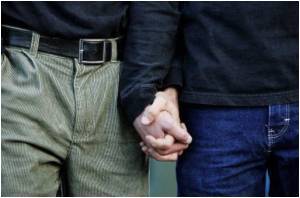
The organiser of the tournament is Russia's only officially registered gay sports federation. Its members meet regularly to compete and socialise.
But now it has a much bigger goal: to hold for the first time a gay sports tournament in Moscow after Russia hosts the 2014 Olympics in Sochi in February, and attract major international sports figures to support their cause.
"For us this is a very large-scale project, we haven't held anything at this level before," said 33-year-old Elvina Yuvakayeva, the co-president of the Russian LGBT Sports Federation.
They want to hold the five-day Russian Open Games between the Winter Olympics and the Paralympics being held in the Black Sea resort of Sochi so that sports people and journalists have time to travel to Moscow.
"It's a gesture... We hope to attract the attention of sports people and those who are covering the Games in Sochi," said Yuvakayeva, who works at an engineering company.
But the event risks being the target of homophobic attacks or a ban, especially after President Vladimir Putin in June signed a law banning what it says is the promotion of homosexuality to minors.
The loosely worded law has prompted outrage among international rights campaigners and celebrities including Madonna and British comic Stephen Fry.
With events including tennis, swimming and cross-country skiing, the gay games are being planned as just a national event with only Russian amateur sports people competing.
The organisers argue the event would not fall under the controversial law.
"As for the law on propaganda, we don't invite minors to our events... that includes the audience, too," said Yuvakayeva, specifying that both spectators and participants have to register online and confirm they are over 18.
Unlike street protests, the gay sports federation is not required to clear its events with the authorities.
"I'm sure we won't have any problems," said the group's co-founder Konstantin Yablotsky, an openly gay amateur figure skater who teaches chemistry at a Moscow school.
The organisers said they were now working on recruiting international stars to support the gay games, while holding out little hope that Russians would come.
US diving gold-medallist Greg Louganis, who is openly gay, has promised to come, said Yablotsky.
"He personally told me that yes, he will support us."
Yablotsky said he was also inviting the husband of openly gay US skating star Johnny Weir, Victor Voronov, who has Russian origins, although it was unclear whether Weir himself could come.
"I am negotiating now with his husband, so we hope we will have him here."
No major Russian sports figures are out of the closet. Pole vault star Yelena Isinbayeva has backed the anti-gay law and called protests against it disrespectful to Russians.
One gay Russian sportswoman had previously supported the federation but was then ordered by her sponsor not to make any comment ahead of the Sochi games, Yuvakayeva said.
The organisers also spoke of meeting another well-known Olympic champion who declined to even discuss her views because she is involved in politics with Russia's ruling party.
The Russian LGBT Sports Federation was founded by Yablotsky and Viktor Romanov, a retired investigator who probed organised crime in the 1990s, after they met at the international 2010 Gay Games in Cologne.
While Russia's most high-profile gay activist, lawyer Nikolai Alexeyev, regularly clashes with the authorities, the sports group takes a much more cautious approach.
It is officially registered as a non-profit group that promotes LGBT sport. It regularly asks the sports ministry and city officials for funding, although it only receives rejection letters.
"We want dialogue with the authorities, with NGOs and with the public," said Yuvakayeva.
"We want to make an effort to remove the stigma from our community."
Those playing badminton called the sports group a vital outlet.
Nineteen-year-old student, Ivan, had made a seven-hour bus journey from the regional city of Smolensk to attend for the first time.
"I had to overcome my fears and make a huge effort to come," he said.
"Everyone here is different, everyone is excellent, and you already don't feel disadvantaged. You become a person."
"Sport brings people together so much," said Maria, a 28-year-old Moscow IT professional.
"I like that different people come here, socialise and play. It's better than virtual communication on the Internet," said businessman Yelisei.
All declined to give their surnames, saying they feared reprisals and because they are not out to everyone they know.
Several said they feared trouble over the planned gay games.
Yelisei said he thought the games should be held in secret, with an announcement after the fact.
"As soon as world media notices them, and they are discussed, the authorities will start asking questions about the activities of the organisers and will do everything they can to shut them down."
Source-AFP








